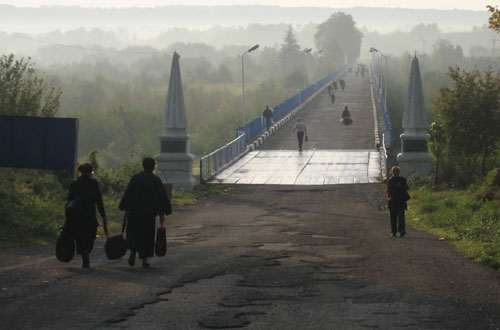
‘Living in Limbo’ – Human Rights Watch Report on Gali

Human Rights Watch photo of the bridge over Enguri river, which is now regarded by the breakaway region’s authorities as the only “legal crossing point” on the administrative border.
Arbitrary interference by the Abkhaz authorities with the rights of ethnic Georgians living in Gali district of the breakaway region has been “a serious obstacle for a larger scale, sustainable returns” of displaced people, according to a report by the Human Rights Watch released on July 15.
The 71-page report documents key human rights concerns for the Georgians of Gali, involving “discriminatory” system for enjoying range of civil and political rights, as well as restrictions on freedom of movement and access to Georgian-language education.
“Ethnic Georgians from Gali overwhelmingly conveyed to Human Rights Watch a sense of acute vulnerability to theft, kidnapping for ransom, armed robbery, extortion and other crimes,” reads the report, which is also based on interviews with more than hundred of Gali residents conducted on both sides of the administrative border.
The New-York based rights group said that a failure from the Abkhaz authorities to recognize and protect rights of ethnic Georgian returnees in Gali district would “at best cause tens of thousands of people to live in a constant state of anxiety and limbo” and “at worst, it could force large numbers of Abkhazia’s ethnic Georgians to leave their homes forever.”
About 45,000 or 47,000 Georgians are believed to have returned to Gali district spontaneously. The report notes that there is no reliable system of registering returnees.
Commuting back and forth across the administrative boundary line is important for many Georgians in Gali, because while they may live in the breakaway region, they visit relatives, receive Georgian government’s social benefits, medical care and in some cases attend schools on the other side of the administrative border, mainly in Zugdidi district.
“However, since August 2008 the Abkhaz authorities have restricted returnees’ ability to commute across the boundary by eliminating three of the four ‘official’ crossing points, and by requiring special crossing permits for those who do not possess Abkhaz passports,” according to the report.
Those willing to obtain special crossing permits have to go to the town of Gali – an expensive, time-consuming and burdensome process for those living in the villages of the district. The report brings an example in which if a resident of Pirveli Otabaia village, which is less than two kilometers from the administrative border, wants to get such crossing permit, it will require a resident to make 28-km drive to the town of Gali, which will take two hours because of road’s poor condition.
The permit costs 100 rubles, or about USD 3.5, but in fact anyone willing to cross the administrative border has to pay twice more in a form of bribe, according to the report; if the necessary documents expired then the bribe can be up to USD 35 for crossing the administrative border on the Enguri bridge, which is now regarded by the Abkhaz authorities as the only “legal” crossing point.
“Abkhaz border guards do sometimes solicit bribes from Gali residents to sneak them through Russian patrols at unofficial border crossings,” according to the report.
The authorities in Abkhazia say that restrictions on movement is a temporary measure and there would be five “legal border crossing points” after the Russian border guards complete development of the border infrastructure.
The Human Rights Watch says that access to Georgian-language education for ethnic Georgians in Gali district “is also restricted.”
“Access to Georgian-language education was a primary concern to most of those interviewed by Human Rights Watch in Gali district and largely influences their decision about whether to stay in Gali or leave,” the report says.
In upper Gali district, according to the report, Russian gradually replaced Georgian as the main language of instruction. Several schools in upper Gali, however, continue to unofficially teach in Georgian, except when they are inspected by the local authorities.
“[These schools] keep two registries, one in Russian and the other in Georgian. However teachers and principals risk disciplinary action, including dismissal, for doing this,” the report says.
Eleven schools in lower Gali district continue to teach in Georgian, which is permitted by the local authorities mainly because they do not have the resources to provide those schools with Russian-speaking teachers, according to the report. But their future status as Georgian-language schools remains uncertain.
“Teachers and parents worry that as the Abkhaz authorities devote more resources to ensuring Russian as the language of instruction in all schools in Gali, Georgian-language schools will disappear altogether,” the report says.
The report also says that although the Abkhaz authorities emphasize that they do not compel anyone to obtain Abkhaz citizenship, “by putting in place a system that requires an individual to obtain the Abkhaz passport in order to enjoy certain rights, the authorities are arbitrarily interfering with those rights.”
This post is also available in: ქართული Русский